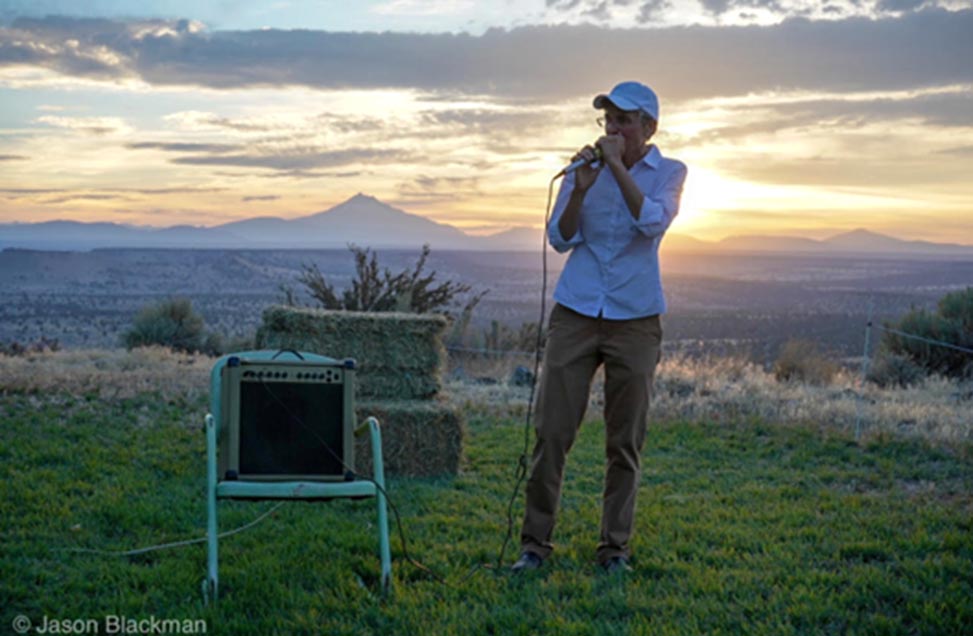MEET JAMIE
Raised by a single mom when she was young, Jamie McLeod-Skinner worked her way through college and became an engineer, a public servant, and a small business owner. Jamie led the effort to help Oregon communities recover after the devastating fires and she currently works in emergency preparedness, affordable housing, and as a leader in protecting Oregon’s watersheds. She will bring her diverse experiences to address our biggest challenges: fighting for working Oregonians, protecting our environment, and preserving our democracy.
Jamie McLeod-Skinner has a lifelong commitment to building healthy, equitable, and resilient communities.
Through professional work, public service, and volunteerism, she uses her background in engineering, regional planning, law, and as a small business owner to bridge our divides for better stewardship of our environment, economy, and democracy.
Jamie began her public service managing the repairs of schools and hospitals in post-war Bosnia and Kosovo before returning to the U.S. to manage refugee resettlement programs, work in city and environmental planning, and serve on a city council. She has led organizational change, mediated community disputes, and protected our natural resources. In 2021, Jamie led wildfire recovery efforts as Interim City Manager in a southern Oregon city that lost a third of its homes and businesses to a catastrophic fire, managed her team through crises and developed the relationships to bring in millions of recovery aid dollars and emergency housing while ensuring culturally appropriate services for those impacted. She currently serves as a Regional Emergency Coordinator, helping to provide affordable housing to those in need.
Her public service includes serving on the Oregon Watershed Enhancement Board, where she co-chairs the Water and Climate Committee, led passage of a Climate Resolution, and expanded the agency’s work with Tribal Nations and diversity, equity, and inclusion. Jamie also serves on the Jefferson County Education Service District Board, where she led passage of a racial justice and equity policy and the development of an Advisory Board to increase community input.
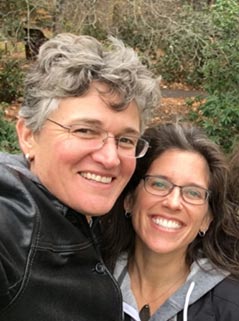
Jamie is an attorney and member of the Oregon State Bar and American Institute of Certified Planners (AICP). In addition to numerous diverse law, planning, and environmental organizations, Jamie is a member of the Disabled Veterans of America Auxiliary.
A former union member, Jamie is a strong advocate for Oregon’s working people, family farmers, and urban and rural communities.
She is a stepmom and lives with her wife in rural Central Oregon where they raise goats and chickens. In her spare time, she enjoys spending time with family in Oregon’s great outdoors.
GROWING UP RURAL
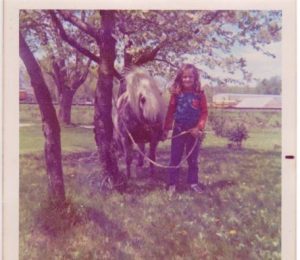
Born in the Midwest where her grandparents worked in a factory, Jamie watched her single mom wake early to drive a school bus, teach all day, bus kids home, and pick fruit in the summers to put food on their table. It instilled in Jamie a deep respect for how hard it can be to make ends meet and the dignity of working hard to provide for your family.
When Jamie was nine, her mom accepted a teaching job at a government school in Tanzania. While it meant learning a new language and culture, Jamie thrived in the kindness of a setting that valued elders and wisdom over wealth. Neighboring Uganda was not as fortunate, suffering under the murderous dictator Idi Amin. Several of Jamie’s classmates were refugees from Uganda, and she still recalls their chilling stories. It instilled Jamie a profound understanding of the importance of ethical governance. She spent her final year in East Africa at the International School of Moshi where she joined classmates in climbing Mount Kilimanjaro.
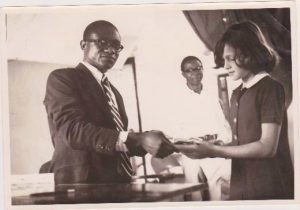
After returning to the United States, her family moved to southern Oregon where she developed her love for Oregon’s great outdoors and natural environment through hiking, rafting the Rogue River, and running on Steens Mountain.
Jamie graduated from Ashland High School, where she still holds the 800-meter track record. She helped her family make ends meet by mucking horse stalls and bucking hay.
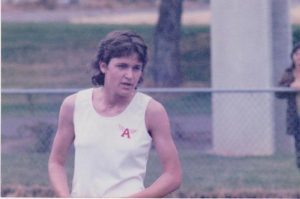
Jamie’s interest in bringing people together to build healthier communities began early. She studied cultural anthropology and agricultural engineering before earning a Bachelor of Science degree in Civil Engineering from Rensselaer Polytechnic Institute and a Master of Regional Planning from Cornell University with a concentration in Environmental Planning. Her Master’s thesis was an analysis of a program designed to protect both a municipal water supply and the agricultural economy at the source water’s location. Later, she earned a Juris Doctorate from the University of Oregon School of Law with a concentration in Natural Resource Law and Indian Law. Her legal research was on hydroelectric facilities on Tribal lands.
A LIFE OF SERVICE
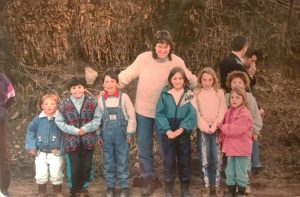 Children in Kosovo expressed excitement about fixes to their war-damaged school. Repairing the roof, windows, and heating system enabled them to study without being cold. Access to running water and repairs to the sanitation system helped protect their health[/caption]
Children in Kosovo expressed excitement about fixes to their war-damaged school. Repairing the roof, windows, and heating system enabled them to study without being cold. Access to running water and repairs to the sanitation system helped protect their health[/caption]
She worked as an Engineer – conducting soil and water testing – and as an Environmental Analyst – writing Phase I and Phase II environmental reports – before starting her public service career in Bosnia and Kosovo. The war had just ended, and the International Rescue Committee (IRC) hired Jamie to manage the reconstruction of schools and hospitals. She designed water and sanitation systems, negotiated with contractors, coordinated with governmental and nonprofit agencies, and safely led her team of complete projects on schedule and under budget in politically tense conditions.
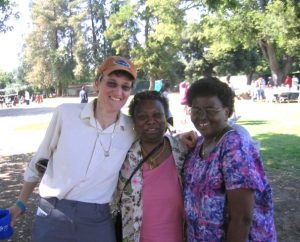
When she wanted to return to the United States, the IRC asked Jamie to serve as Regional Director for their San Jose refugee resettlement office. Her responsibilities included strategic planning, relationship building, managing teams and finances, developing resources and programs, political engagement, and working with the media to help the community understand the refugee experience. Seeing the interest in newly arrived leaders in establishing their own nonprofits, Jamie developed a capacity building program to help form community-based organizations and facilitate access to the necessary resources. It was expanded to a statewide program, where she facilitated trainings for 50 refugee and immigrant community organizations and facilitated project collaborations between competing organizations.
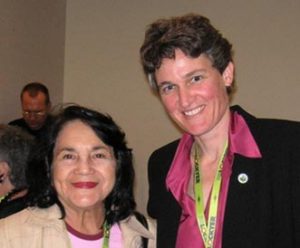
Her focus on organizational development and responsive government led Jamie to Sunnyvale, where she joined the city’s Organizational Effectiveness Team, helping to implement an outcomes-based management system. Using the Malcolm Baldridge organizational assessment model, her role was to conduct internal and external customer surveys, assist with employee recognition, and train new managers on process improvement.
With systems established, Jamie stayed on with the City of Sunnyvale, focusing on community building as a city planner. The city faced the challenge of ensuring development projects met code and environmental compliance while respecting cultural diversity in a rapidly growing city. Jamie’s skills with diverse communities and conflict resolution made her a natural fit to manage the compliance and public input process for the city’s most controversial residential, commercial, mixed-use, and industrial developments. She was also tapped for her policy skills, developing strategies to achieve the city council’s land use goals and designing the city’s first solar plan.
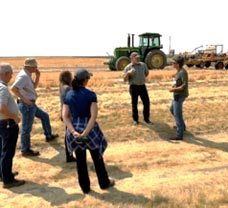
Her interest in focusing on environmental issues full time led her to the Santa Clara Valley Water District where she worked as an environmental planner for a regional agency that served over 2 million people in 15 cities in urban and rural areas. Jamie was responsible for environmental review and public engagement for water quality and supply, water transfers, recycled water, groundwater recharge, habitat conservation, and wetlands protection projects. She also developed best management practices to reduce greenhouse gas (GHG) emissions from agency activities.
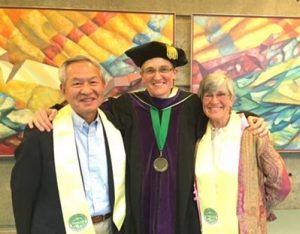
Committed to solving environmental challenges, Jamie decided to augment her engineering and regional planning background with legal training. She earned her law degree from the University of Oregon School of law, focusing on Natural Resource Law and Indian Law.
During law school, she clerked for the U.S. Army Corps of Engineers, the Oregon Land Use Board of Appeals, and Klamath County Circuit Court Judge Cameron Wogan, who presided over the Klamath Basin Adjudication.
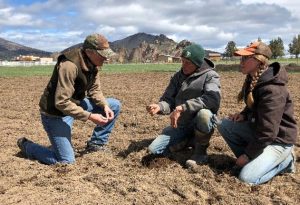
Jamie later started her consulting business, offering legal counsel and general consulting for land use, natural resource management, housing, organizational development, and community engagement. Projects include facilitating a bi-partisan group working to avoid regional conflict from the impact of drought, and facilitation of a diverse coalition of partners providing input on a community-focused affordable home-ownership project that can serve as a model to address the affordable housing crisis.
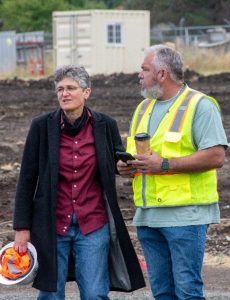
In the fall of 2020, the devastating impacts of climate change sparked wildfires across the West Coast, including in Jamie’s childhood backyard of Southern Oregon. Hardest hit by the Almeda Fire was the City of Talent, which lost a third of its homes and businesses. The destruction reminded Jamie of what she had seen in war-torn Bosnia. She stepped in to lead the city’s team from crisis to recovery as Interim City Manager. Jamie built regional partnerships, improved the city’s outreach and responsiveness to vulnerable communities, expedited permitting, and secured millions in state and federal recovery resources.
She ensured the city provided culturally appropriate community engagement, including interpretation at city council meetings. She advocated for farmworkers experiencing high rejection rates for emergency relief, coordinating on-site application review with interpretation services, and ensured families would not be intimidated for seeking resources.
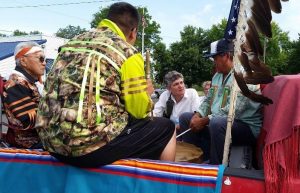
Jamie was honored to worked with an incredible team, and the respect was mutual. When she left, the city and Police Department staff presented her with a plaque reading: “In recognition of your vision, inspiration, and leadership to the community and staff, thank you for your service in this time of recovery and healing from the Almeda Fire. It has been a privilege to work with you!”
After returning to Central Oregon, Jamie received several requests to share her experience and advice on emergency recovery and response. In recognition of her recent leadership as well as her training in the National Incident Management System, the Oregon Department of Human Services hired her to join their Resilience and Emergency Management team. She has helped the agency connect with vulnerable communities and assist those impacted by disaster access to emergency resources.
COMMUNITY LEADERSHIP
Throughout her professional career, Jamie has actively engaged in volunteerism, public service, and community-driven solutions. Based on her policy expertise and community relationships, she was encouraged to run for elected office early in her career.
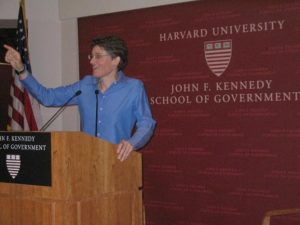
She developed her leaderships skills through professional and academic experiences. Jamie received a leadership certificate in Senior Executives in State & Local Government from Harvard University’s John F. Kennedy School of Government. She attended the Santa Clara University Markkula Center for Applied Ethics program on Ethics for Public Officials and attended their ongoing refresher activities throughout her term on the city council. She also received a leadership certificate from the University of Oxford for participation in Oxford’s Consortium for Human Rights.
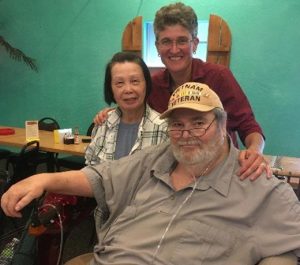
In 2004, Jamie’s strong relationships with diverse communities helped her defy the political odds and win election to the Santa Clara City Council.
She served for eight years, providing policy and fiscal oversight for a full-service city with 990 employees and a $570 million budget. She advocated for a strong environmental policy for the city’s public utility, leading the city to achieve a 35% renewable energy goal in less than five years. Jamie championed labor rights and led passage of an anti-discrimination ordinance with protection for Transgender people. She also represented the city on numerous occasions, including leading a delegation to South Korea to explore a Sister City relationship with Yeongcheon, and at The Prince of Wales’ California Leaders Round-Table Dialogue discussing international strategies to address climate change while maintaining strong economies.
As the first out lesbian elected in the South Bay area, Jamie was a celebrated leader in the LGBTQIA community, recognized by OutNow Magazine as “Leader of the Year” and serving as Grand Marshall in the San Jose LGBT Pride Parade.
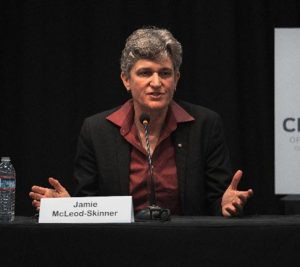
She served on the Sustainable Silicon Valley Board, a non-profit think tank focused on water use and reuse, air quality, and promoting equitable and sustainable communities. When regional policy makers grappled with reducing greenhouse gas emissions, Jamie co-founded a County Green Building Coalition that invited environmental groups, developers, and policymakers to explore mutual interests. It resulted in development of a 3-tiered approach, which was approved by developers and adopted by cities, to standardized development applications reviews while incorporating green building standards. Jamie’s approach of building partnerships to achieve policy became her hallmark.
Known for her expertise on environmental issues – and steadfast ethics – Jamie served on several policy committees. As Chair of the county’s Recycling and Waste Reduction Commission, she led development of a single-use plastic bag ban that became a model for state law. Her leadership on environmental committees included the Water Supply and Conservation Agency, Clean Water Financing Authority, Regional Water System Financing Authority, and Treatment Plant Advisory Committee. Jamie’s other assignments included the city’s Audit, Ethics, Economic Development, Housing Rehabilitation, and Neighborhood-University Relationship committees.
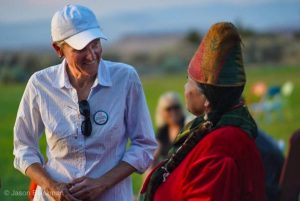
“Public service is not just about what we do, it’s also about how we do it,” Jamie has said. “To serve ALL Oregonians well, we must listen to traditionally underserved communities and incorporate diversity, equity, and inclusion practices into how we do our work.” She has lived this practice in both her professional work and volunteer activities. She has worked to develop diverse leadership in urban and rural areas, through her service on the Northwest Health Foundation Board and her Team Jamie for Oregon organization.
Her commitment to our environment has extended beyond the U.S., traveling to India to assist Water For People with assessments of rural water points on Sagar Island. And she worked with engineers at a sewage treatment plant in Nizhny Novgorod, Russia, to address their challenge of removing heavy metals from treated municipal wastewater discharged to the Volga River.
A strong theme in Jamie’s community work is bridging our divides. The training for her volunteer work as a mediator and coach for a dispute resolution program has been incorporated into her other community involvment.
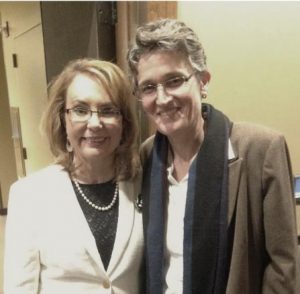
After the horrific shooting of Congresswoman Gabby Giffords, a friend from graduate school, Jamie co-founded Breaking Bread, Breaking Barriers, which was a monthly gathering for people with different political, religious, and cultural viewpoints to discuss current issues and understand each other’s perspective.
Frustration with the lack of response from the district’s representative to the pressing needs of working families and rural communities led Jamie to run for Congress in 2018 in a district that included southern, eastern, and Jamie’s home in Central Oregon.
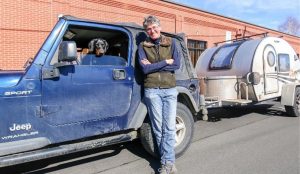
She traveled over 45,000 miles to engage Oregonians in crafting solutions for environmental protection, healthcare, and economic stability. She won a crowded primary, and while she lost in the general, she far surpassed expectation. Her style of showing up, listening, and building bridges resulted in her earning the largest voter swing of any congressional race in the country that year.
Four years later, when redistricting connected Central Oregon to the Portland Metro area through Oregon’s 5th Congressional District, Jamie responded to the call to run again. Her statewide relationships and ability to connect with voters on economic, environmental, housing and public health issues enabled her to accomplish something not done in Oregon in 42 years: unseating an incumbent in the primary. The general election was one of the most competitive in the country, and a combination of factors – including $8 million spent in attack ads against her – caused Jamie to narrowly lose. However, she inspired over 1,500 volunteers in her race, raised almost $5 million in mostly small dollar donations, helped Oregon have the largest voter turnout in the nation in 2022, and is credited with helping other candidates prevail in close state and local races.
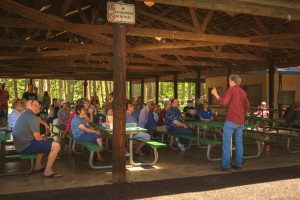
Jamie is a sought-after presenter on numerous topics, including Bridging Our Divides, Leading Through Climate Chaos, Emergency Response and Recovery, Mitigating Hazards to Critical Infrastructure, Environmental Planning, Community Driven Solutions to Address Water Conflicts, and Rural Leadership Development.
LOOKING FORWARD
Leadership begins with setting a vision, modeling how to achieve it, and supporting the growth and learning necessary to achieve it.
A known champion of protecting our natural resources, building healthy communities, and bridging our divides, Jamie consistently demonstrates the leadership needed to serve our whole communities, including those traditionally overlooked.
